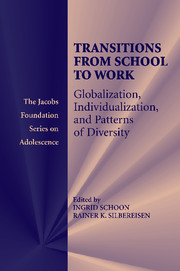Book contents
- Frontmatter
- Contents
- List of Illustrations
- List of Tables
- Contributors
- Acknowledgments
- I Introduction
- II Transitions and Global Change
- 3 Is Stable Employment Becoming More Elusive for Young Men?
- 4 Youth Outcomes in the Labour Markets of Advanced Economies: Decline, Deterioration, and Causes
- 5 Uncertain and Unable to Commit: A Fourteen-Country Comparison of the Impact of Globalization on the Early Life Course
- III Individual Decision Making
- IV Mapping Diversity and Change
- V Interventions and Policies
- Index
- References
5 - Uncertain and Unable to Commit: A Fourteen-Country Comparison of the Impact of Globalization on the Early Life Course
Published online by Cambridge University Press: 22 December 2009
- Frontmatter
- Contents
- List of Illustrations
- List of Tables
- Contributors
- Acknowledgments
- I Introduction
- II Transitions and Global Change
- 3 Is Stable Employment Becoming More Elusive for Young Men?
- 4 Youth Outcomes in the Labour Markets of Advanced Economies: Decline, Deterioration, and Causes
- 5 Uncertain and Unable to Commit: A Fourteen-Country Comparison of the Impact of Globalization on the Early Life Course
- III Individual Decision Making
- IV Mapping Diversity and Change
- V Interventions and Policies
- Index
- References
Summary
Introduction
Young people in industrialized nations have experienced significant changes in the transition to adulthood in recent decades. Globalization, via the (1) internationalization and importance of markets, (2) intensified competition, (3) accelerated spread of networks and knowledge via new technologies, and (4) increasing dependence on random shocks, has transformed the transition to adulthood. The purpose of this chapter is to ask to what extent these changes have influenced young people's ability to establish themselves as independent adults when making the school-to-work transition, forming partnerships, and becoming parents. Has globalization produced a fundamental shift in the behavior of youths as they cope with increasing uncertainty about the future? How do different domestic institutions filter these transformations?
This chapter develops a multilevel conceptual framework of how globalization impacts the transition to adulthood and summarizes the main results from the first phase of the international research project GLOBALIFE (Life Courses in the Globalization Process) (Blossfeld, Klizjing, Mills, & Kurz, 2005). The study includes fourteen country-specific studies, from Canada (Mills, 2005), the United States (King, 2005), Great Britain (Francesconi & Golsch, 2005), Germany (Kurz, Steinhage, & Golsch, 2005), the Netherlands (Liefbroer, 2005), France (Kieffer, Marry, Meron, & Solaz, 2005), Norway (Nilsen, 2005), Sweden (Bygren, Duvander, & Hultin, 2005), Italy (Bernardi & Nazio, 2005), Spain (Simó Noguera, Castro Martín, & Soro Bonmatí, 2005), Mexico (Parrado, 2005), Ireland (Layte, O'Connell, Fahey, & McCoy, 2005), Estonia (Katus, Purr, & Sakkeus, 2005), and Hungary (Róbert & Bukodi, 2005).
- Type
- Chapter
- Information
- Transitions from School to WorkGlobalization, Individualization, and Patterns of Diversity, pp. 95 - 118Publisher: Cambridge University PressPrint publication year: 2009
References
- 10
- Cited by



